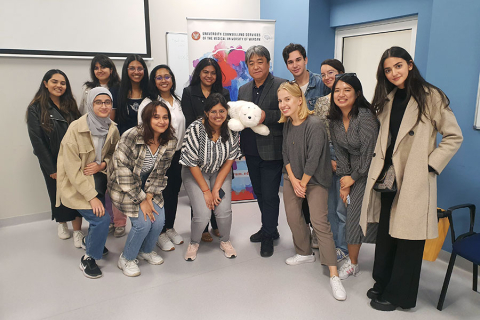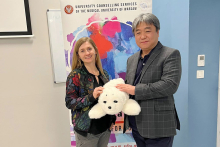Prof. Takanori Shibata, as he was referred to, introduced the meeting participants to the world of PARO artificial intelligence. He talked about the characteristics of companion robots, whose main task is to improve mood and overcome stress levels. The robot is also used for socialization - it teaches how to establish relationships, stimulates interaction between patients and caregivers, and reduces the level of loneliness. Together, they considered the advantages and limitations of working with PARO seal compared to classical animal-assisted therapy. As Prof. Shibata explained, PARO is of great benefit in those hospitals and care centers where live animals can be an obstacle to treatment or their introduction poses a logistical problem. The meeting participants also sought optimal applications for robots at MUW - both in clinical and non-clinical contexts (e.g., the organization of workshops).
The robots were donated to the university as part of its support and assistance to Ukraine. They came under the care of the Psychological Counseling Center MC MUW and the Study of Health Psychology MUW. Where are the seals currently "working"? - Our activities with PARO so far are targeted - we search for centers where more children from Ukraine are staying or studying and direct them there for a specific period of time. PARO seals are used, among others, in kindergartens and elementary schools, supporting the integration of children from Ukraine with those from Poland. They are also used to work with Ukrainian children with a diagnosis of autism spectrum disorders (at the Center for Integrative Therapy the SPEKTRUM). They also support us in our work with students at the Psychological Counseling Center MC MUW, where we are also frequently visited by Ukrainian students. PAROs are very busy employees at MUW - says Dr. Magdalena Łazarewicz from the Study of Health Psychology MUW, organizer of the meeting.
Students who have ideas on the use of PAROs and would like to get involved as volunteers and also would like to co-author a review article on PAROs are encouraged to contact Dr. Łazarewicz (magdalena.lazarewicz@wum.edu.pl).

